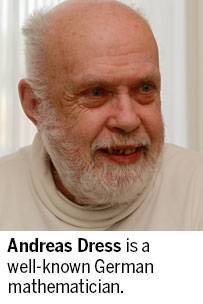| News & Events |
| Location:Home > News & Events > Science and Technology News |
| Nation's scientists are getting closer to Nobel |
BEIJING - Andreas Dress believes it won't be long before a person from China is awarded a Nobel Prize for science. "I am pretty sure Chinese people will get a Nobel Prize for work done in China within the next 10 years," said the 74-year-old German mathematician. He even has a candidate and specific achievement in mind. "One person in China who currently deserves a Nobel Prize is Dr Chen Zhu. And there will be others to follow," Dress said. Chen, who has a doctorate from the Universite Paris 7, has worked with French colleagues such as medical expert Hugues de The and has made outstanding breakthroughs in leukemia therapy. Dress and Hugues de The are two of the eight foreign recipients of the 2011 International Science and Technology Cooperation Award. They received the top honor at the Great Hall of the People in Beijing on Feb 14. Dress is well known in pure mathematics research and numerous application areas. He served as the first managing director of the Chinese Academy of Sciences-Max Planck Gesellschaft Partner Institute for Computational Biology from 2005 to 2010. Dress learned of Chen Zhu's work on China Central Television's English channel in 2007. That year, Chen was appointed the country's minister of health. Dress saw that as a step forward for China. The lack of recognition has to do with the one-sidedness of the Nobel committee, Dress said. Before World War I, Germans dominated Nobel awards. After many German scientists fled to the United States because of the Nazis, the Americans, with their own rapid development, were put in charge of recommending Nobel laureates, a practice that continues today. Dress said producing indigenous Chinese Nobel winners will help change how scientists' successes are measured in China. He noted that those holding degrees from foreign universities tend to receive more respect than their peers who have always studied in China. "People should be judged by their work, not by where they studied. The scientific community should respect scientists and make it clear that research done in China can also be highly valued," he said. The quality of science research in China is as good as anywhere else in the world, particularly in the field of mathematics, Dress said. "The main issue today, faced by other nations, too, is how to educate people to be curiosity-driven and use their own brains," he said. At the award ceremony on Feb 14, Premier Wen Jiabao called for scientists to be rigorous in independent thinking and academic integrity. China is a victim of widespread academic fraud and scientific misconduct. Dress said "that happens everywhere", including in Germany and North American countries. People in China are aware of such problems. What needs to be done, not only in China but in other countries as well, is to make it clear that such behavior is unacceptable, and those who cheat should bear the consequences, Dress said. Citing Wen's interview with Science magazine in 2008, in which scientists were urged to "cultivate scientific ethics", "be bold in innovation and tolerant to failure", Dress said this attitude will relieve Chinese scientists from the pressure to be successful quickly. (China Daily) |
| Appendix Download |
|
|
